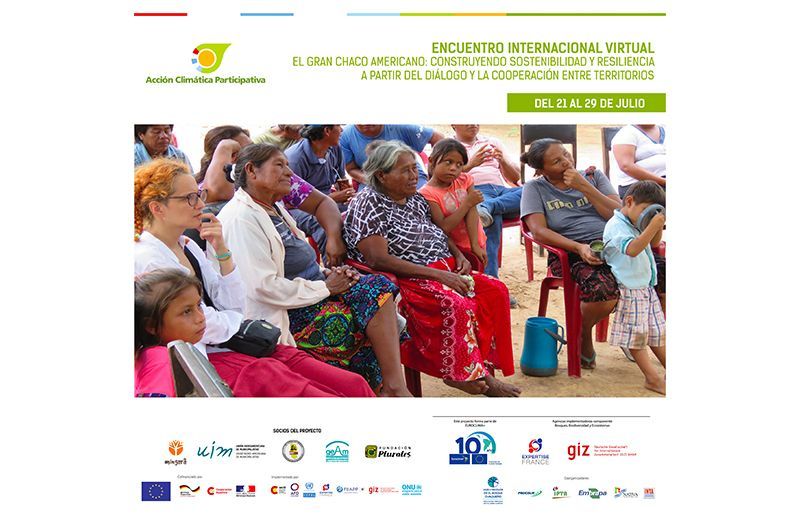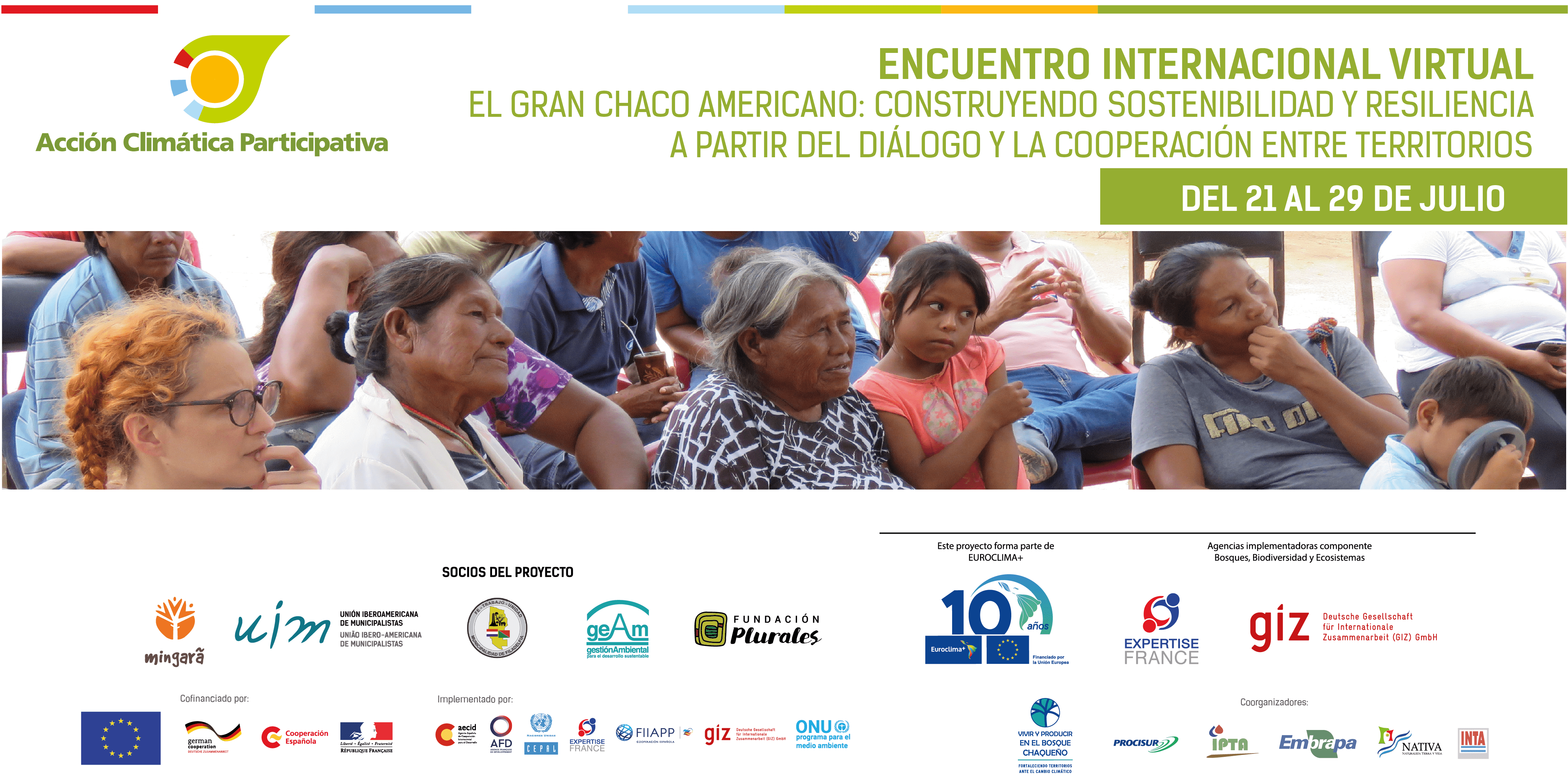Virtual event organised by the Participatory Climate Action project for July 21 to 29.
| Date: | July 21 to 29, 2020 |
| Time: |
A partir de las 10:00 a.m. (hora en Paraguay) |
| Register here: | https://iencuentrogranchaco.accionclimaticaparticipativa.org/register/ |
International meeting towards sustainability and resilience in the Greater American Chaco
The event will address 4 thematic areas:
- Water Security and Food Safety (July 21)
- Workshop “Forests, Biodiversity and Ecosystem Services in the Greater American Chaco. From territorial problems to participatory socio-environmental governance” (July 24)
- Gender Focus in Climate Change Adaptation Actions (July 27)
- Green Development (July 29)
- Registration is free and can be done through the following link: https://bit.ly/38Cin6U
- To see the complete programme you can access https://bit.ly/3ftuypw. Each participant will have an address and a password to enter the platform and have access to audiovisual materials, abstracts, papers, links and discussion forums.
The challenges of the Greater American Chaco
The Greater Chaco covers approximately 1,000,000 km² of South America, and it is considered the largest continuous dry forest in the world and the second largest forest biome in South America. It represents the largest dry forest ecosystem and the second largest forest ecosystem outside the Amazon in South America, with an environmental mosaic of savannahs to swamps, extending between the Brazilian Cerrado and the Andes.
Promoting sustainable growth
During the international meeting, attendees and exhibitors will be able to access a digital platform (https://bit.ly/38Cin6U) to socialise, share aspects of the presentations, and make queries. It is expected to create a large community around issues associated with climate change, mainly for the Chaco region and other Latin American countries.
It will also be possible to socialise with the scientific community, academics and the public about advances in research and innovative approaches to climate change adaptation in complex ecosystems. Valuation of biodiversity and ecosystem services will be promoted within land management processes.
What else does the meeting offer?
- Access to expert knowledge
To discover current and valuable information on various experiences that are being developed in Latin America. - Participate in the debate through forums
Discuss the future of the territories and reflect on the role of each in the conservation of natural resources - Networking
Create alliances and talk with professionals linked to territorial sustainability - Boosting project visibility
To publicise initiatives and share ideas on sustainability and resilience of territories. - Understanding social changes and new challenges
Discover how climate change affects natural resources and how our future will change because of this.
Contacts
- Inocencia Ramírez, Paraguay, Participatory Climate Action Project, Communication Area, This email address is being protected from spambots. You need JavaScript enabled to view it.
- Telephone: +595985475811
- Julio Rodas, project general coordinator, NGO Mingara - Association for sustainable development
This email address is being protected from spambots. You need JavaScript enabled to view it.
Telephone: +595983153040 - Paula Juarez, coordination in Argentina, Fundación Plurales
This email address is being protected from spambots. You need JavaScript enabled to view it.
Telephone: +549113248-8536 - José Chira, coordinator in Spain, Ibero-American Union of Municipalists
This email address is being protected from spambots. You need JavaScript enabled to view it.
Telephone: +34636514488 - EUROCLIMA+ Communications:
This email address is being protected from spambots. You need JavaScript enabled to view it.
The "Participatory Climate Action" project is part of the "Forests, Biodiversity and Ecosystems" sector of the EUROCLIMA+ programme, implemented by the agencies Expertise France (EF) and the German Society for International Cooperation (GIZ). Learn more about the project here.
About EUROCLIMA+
EUROCLIMA+ is a programme financed by the European Union and co-financed by the Federal Government of Germany through the Federal Ministry for Economic Cooperation and Development (BMZ), as well as by the governments of France and Spain. It aims to reduce the impact of climate change and its effects in 18 Latin American and Caribbean countries by promoting climate change mitigation and adaptation, resilience and investment. The Programme is implemented under the synergistic work of seven agencies: the Spanish Agency for International Development Cooperation (AECID), the French Development Agency (AFD), the Economic Commission for Latin America and the Caribbean (ECLAC), Expertise France (EF), the International and Ibero-American Foundation for Administration and Public Policy (FIIAPP), the German Society for International Cooperation (GIZ), and UN Environment.


